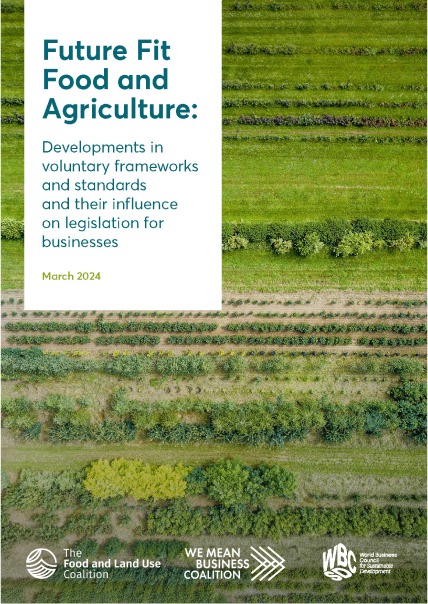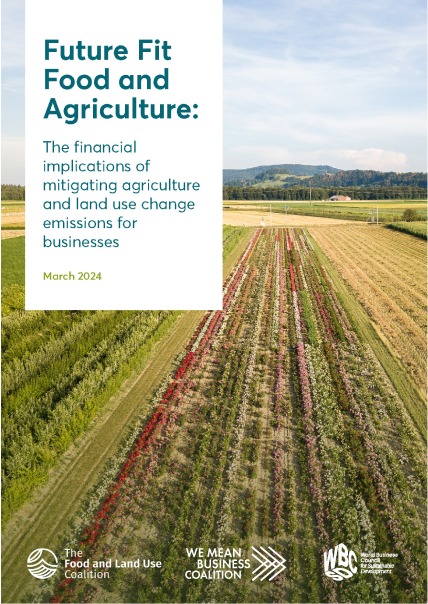The Future Fit Food and Agriculture report series argues for the adoption of ambitious sustainability action plans by agrifood companies and sector-wide investments of approximately USD $205 billion per year between 2025 and 2030 to unlock up to 9 gigatons of CO2 equivalent of mitigation annually by 2030. The first report aims to help agrifood companies understand the implications of current and emerging voluntary standards and the expected trajectory of regulation for climate and nature. The second report unpacks the financial costs and benefits of implementing mitigation solutions to tackle agriculture and land-use change emissions in company value chains.
FOLU (2024) The financial implications of mitigating agriculture and land use change emissions forbusinesses #27 p + Key Messages #3 p
 Investment from the food sector of approximately US $205 billion per year between 2025 and 2030 could mitigate up to 9 GtCO2e annually by 2030. While significant, these costs represent less than 2% of total projected food sector revenues and come with other benefits including access to new and growing markets, some on farm savings and improved supply chain resilience.
Investment from the food sector of approximately US $205 billion per year between 2025 and 2030 could mitigate up to 9 GtCO2e annually by 2030. While significant, these costs represent less than 2% of total projected food sector revenues and come with other benefits including access to new and growing markets, some on farm savings and improved supply chain resilience.This report highlights that the burden of mitigation varies depending on where actors sit along the value chain. A critical challenge is that the costs are currently projected to land most heavily on farmers, who are the least able to pay. Overcoming this inequity requires companies to reassess how they partner with actors in the value chain, particularly farmers, and how they engage with policymakers to accelerate action. Currently, farmers are responsible for implementing many of the on-farm and nature protection solutions outlined in Future Fit Food and Agriculture report 2. They carry most of the risks inherent in changing agricultural practices, including learning new skills and practices, and investing in and establishing new infrastructure.
FOLU (2024) Developments in voluntary frameworks and standards and their influence on legislation for businesses #30 p + Key Messages #2 p
Businesses setting and implementing ambitious climate and nature strategies today will be better prepared for future sustainability regulation, facing fewer compliance risks and experiencing less disruption in their supply chains. Ambitious companies can not only leverage established and emerging voluntary standards to get ahead of the game, but they can and should also seize the opportunity to advocate for harmonized standards and regulation, which will accelerate the food sector’s transition to a sustainable future.
In many cases, existing voluntary standards are being used by legislators to inform the development of new regulation. European countries are among those leading this trend, with more countries expected to follow suit. Much of this recent legislation focuses on mandatory due diligence and disclosure, such as: (a) The EU Directive on corporate sustainability due diligence (CSDD) (b) The EU Corporate Sustainability Reporting Directive (CSRD) (c) The EU Regulation on deforestation-free products (EUDR). These regulations demand greater levels of supply chain transparency and public reporting on sustainability strategies from food and agriculture companies. They also carry significant near-term costs for non-compliance.
Related:
11 April 2024. 03:00pm - 04:15pm How Can Businesses Secure a More Sustainable, Equitable and Resilient Future for the Food Sector?- Co-hosted by the Food and Land Use Coalition (FOLU), World Business Council for Sustainable Development (WBCSD), and We Mean Business Coalition, the event will delve into key insights from a recently published report series: ‘Future Fit Food and Agriculture’ revealing that US $205 billion per year is needed from the food sector to mitigate half of global food system emissions.


No comments:
Post a Comment